Paavo Järvi and the Cincinnati Symphony Orchestra: Balanced Season, Special Relationship
Mary Ellyn Hutton
Posted: Mar 26, 2008 - 2:24:56 AM in
news_2008
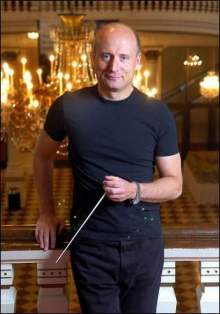
Paavo Jarvi, Music Hall, Cincinnati
|
Programming a subscription season for an American symphony orchestra is a bit of a dilemma.
How do you remain true to the product – classical music is an art form after all, not fast food -- and simultaneously increase attendance?
The tension is exacerbated for the Cincinnati Symphony Orchestra by the dispiriting size of Music Hall. With 3,516 seats to fill, the 130-year-old civic landmark (never intended to be a concert hall) looks empty even when drawing audiences equivalent to or larger than major orchestras in other, even larger U.S. cities.
As is his custom, CSO music director Paavo Järvi, who will be entering his eighth season with the orchestra, has assembled a 2008-09 Music Hall season that strikes a balance between familiar and more challenging repertoire and between established and emerging guest artists. Järvi will conduct 14 of the 24 concert weekends.
In the star column are violinists Midori, Nadja Salerno-Sonnenberg and Christian Tetzlaff, pianists Andre Watts, Yefim Bronfman and Radu Lupu and flutist Emmanuel Pahud. Noted guest conductors include Sir Roger Norrington, who will lead an all-Mozart program, and Rafael Frühbeck de Burgos.
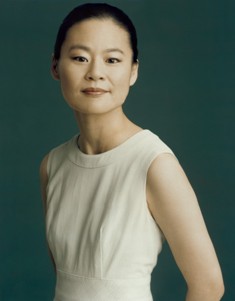
Midori
|
“There are always interesting new people coming, too” said Järvi sporting a Jean-Robert de Cavel goatee the day after a “7 Days for SIDS” mixer at Metronation in Over-the-Rhine March 12.
New to the CSO will be violinist Chloe Hanslip, 20, a former child star in her native England, French cellist Gautier Capucon, 26, German cellist Johannes Moser, 29, and guest conductors James Gaffigan, 27, associate conductor of the San Francisco Symphony, and Russian born Vasily Petrenko, 32, principal conductor of the Royal Liverpool Philharmonic.
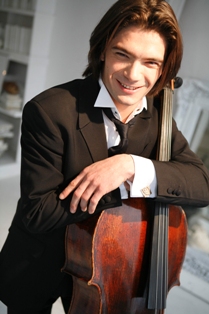
Gautier Capucon
|
“There is always a risk involved with somebody who is not a prominent name,” said Järvi, “but on the other hand, you can also discover something really wonderful and be the first person to introduce it.” He cited the example of violinist Janine Jansen, now an important star whose American debut was with the CSO in Nov. 2006.
Guest conductors returning to the CSO will be Xian Zhang, former faculty member at the University of Cincinnati College-Conservatory of Music, now associate conductor of the New York Philharmonic, the NYPO’s newly appointed music director Alan Gilbert and French conductor Yan Pascal Tortelier.
A very special guest conductor, in his CSO debut, will be Leonid Grin. Ukrainian born Grin, former music director of the San Jose Symphony, was one of Jarvi’s first conducting teachers when he came to the United States from Estonia in 1980.
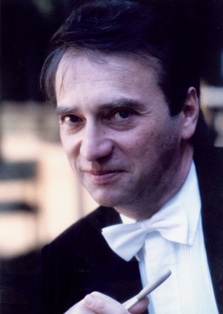
Leonid Grin
|
“He’s a great guy, a very deep human being,” said Järvi, who commuted to New York City from his home in New Jersey to coach with Grin, himself a recent émigré from the Soviet Union. “He is in essence the one who prepared me for Curtis, who took me under his wing in the beginning when I didn’t really know anything. It was all about music and conducting and repertoire, weekends in his house. His wife was cooking dinner and there was always this cheap wine. Everyone was poor at the time and it was fine. The entire class could sleep over there. It was a real Bohemian type of thing.”
African-American violinist Tai Murray, 26, who made a splash in her CSO debut at Riverbend in 2006, will return, as will violinist Julia Fischer and pianists Stewart Goodyear, Louis Lortie, Jon Kimura Parker and Russian powerhouse Denis Matsuev. From the CSO family will be principal French hornist Elizabeth Freimuth, principal second violinist Gabriel Pegis and by extension, pianist Nicholas Angelich, son of CSO violinist Borivoje Angelich.
As for repertoire, the 08-09 season is anchored in timeless favorites, but with lots of newer acquaintances and first dates. There will be plenty of romantics, including Berlioz’ “Symphonie fantastique,” Tchaikovsky’s Fifth Symphony, Saint-Saens’ “Organ” Symphony (No. 3), an all-Dvorak concert including the Cello Concerto (Capucon), Mahler’s First and Second Symphonies and Rachmaninoff’s “Rhapsody on a Theme of Paganini” (Parker).
The season will open Sept. 12 and 13 with Tchaikovsky’s “Festival Coronation March,” Rachmaninoff’s Symphonic Dances and the heart throbbing Piano Concerto No. 2 by Rachmaninoff with Watts on the keys.
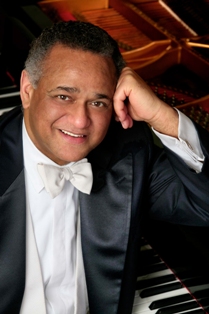
Andre Watts
|
There’ll be 20th-century classics like Stravinsky’s “Petrouchka,” Debussy’s “La Mer” and Holst’s “The Planets” (to be recorded by Telarc with Hindemith’s rousing Metamorphosis of Themes by Carl Maria von Weber). You’ll hear Viennese Classics, too, with symphonies by Haydn (No. 82, “The Bear”) and Mozart (Nos. 33 and 36, “Linz”). All-time favorite Beethoven’s Fifth Symphony returns, too, but look for a fresh, new take based on Jarvi’s highly praised cycle of Beethoven symphonies with the Deutsches Kammerphilharmonie Bremen, now in progress (the First and Fifth Symphonies, third in the series, is due out on RCA Red Seal this summer).
Järvi will combine Brahms’ great “A German Requiem,” featuring soprano Camilla Tilling, baritone Matthias Goerne and the May Festival Chorus, with the CSO premiere of Benjamin Britten’s anti-war Sinfonia da Requiem, an obvious pairing with deeper meanings. Similarly, Saint-Saens’ popular “Organ” Symphony (No. 3) will share a program with the first CSO performance of French organ master Olivier Messiaen’s powerful “Les Ouffrandes oubliees” (“The Forgotten Offerings”).
A favorite that has been AWOL from the concert hall in recent years, Handel’s “Water Music,” will return, Järvi said. “Things like ‘Water Music’ and ‘Messiah,’ need to come back to the symphony orchestra repertoire, but they need to be done by people who have some expertise in how to do it. You cannot do them the way they used to be done in the 1950s and 60s, because the whole way of doing classical and pre-classical music has changed.”
Järvi is not “militant” about authentic performance practice -- i.e. “this is right and this is wrong. No, there needs to be some understanding. The person conducting should have a strong point of view how to do them in an informed way, rather than just ‘I don’t know anything about baroque (music) but I’ll do this piece anyway.’ That would only reinforce the stereotype of over-romanticized, heavy performances which became kind of disconnected from the soul of the work. The reason why all these new, original instrument orchestras were created is because they want to get back to the kind of small work music-making that is not so heavily burdened by the romantic era.
“In the beginning, like any radical, they overdid it, but that’s the way you get movement going. Now they are sort of all conducting normal orchestras and have adopted and adjusted, but the work has been done, that very important thing of cleaning up unnecessary self-indulgence.”
To balance these canonic works, Järvi has programmed a healthy slice of new and less familiar repertoire, including a world premiere by Jeffrey Mumford, an African-American whose music has been commissioned and performed locally with considerable success. The as yet unnamed work is being commissioned for the CSO by Harry and Ann Santen in celebration of their 50th wedding anniversary.
Pahud will be heard in the U.S. premiere of upcoming French composer Marc-Andrew Dalbavie’s Flute Concerto. Järvi will lead the U.S. premiere of Estonian Erkki-Sven Tüür’s “The Path and the Traces” (a beautiful work paired with Tüür’s percussion concerto “Magma” on a widely hailed 2007 Virgin Classics CD by Järvi and the Estonian National Orchestra).
There will be nine CSO premieres, including Astor Piazzolla’s “Four Seasons of Buenos Aires” (Salerno-Sonnenberg), Francis Poulenc’s Sonata for Flute, orchestrated by Lennox Berkely (Pahud) and American composer Jennifer Higdon’s Percussion Concerto featuring Colin Currie, hugely popular soloist in Christopher Rouse’s “Das Gerettete Alberich” with the CSO in 2006.
Also new to the CSO will be Gabriel Faure’s charming “Dolly” suite, Mauricio Kagel’s Etude No. 3 and Gyorgy Ligeti’s early “Concert Romanesc,” inspired by Rumanian folk music, May Festival Chorus director Robert Porco will lead the CSO premiere of Ralph Vaughan Williams’ “A Sea Symphony” (No. 1) with the May Festival Chorus.
Think you know Mahler’s Symphony No. 2 (“Resurrection”)? That will be a U.S. premiere in the new critical edition by Mahler authority Gilbert Kaplan on a special concert led by Kaplan that will include a pre-concert, multi-media presentation “The World of Gustav Mahler” with historical projections and recorded musical excerpts.
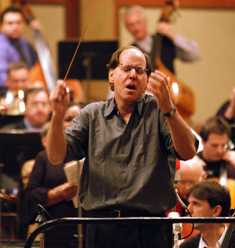
Gilbert Kaplan
|
(It has been 100 years since Mahler led the Second Symphony’s first premiere at New York’s Carnegie Hall.)
Following on this season’s Igor Stravinsky Festival (a season-long focus concluding in May with his “Rite of Spring”), Järvi will preside over a three-concert “Bartok Project” that will include discussion, film and chamber music events in conjunction with performances of his Music for Strings, Percussion and Celesta, Piano Concerto No. 1, “Two Portraits” and Dance Suite. (The CSO led by Fritz Reiner led the U.S. premiere of the First Piano Concerto in 1928 with Bartok himself as soloist.) The Bartok repertoire (except the Piano Concerto) and Ligeti’s “Concert Romanescu” will be recorded by Telarc.
Järvi likes the idea of exploring 20th-century masters. “They are really giants. I am thinking of doing Nielsen, definitely Debussy (also Messiaen, he hinted). They are icons, people who created a completely recognizable and new direction.”
Closing the 08-09 season will be a trademark Järvi program combining Prokofiev’s Symphony No. 6, often thought of as the opposite number to his popular, triumphal Symphony No. 5, and Britten’s American Overture, a work composed during his stay in the U.S. at the outset of World War II, but left unperformed until after his death.
“The Prokofiev Sixth is a dark symphony,” said Järvi. “The last movement could be seen as happy, but far from it. It’s a kind of sarcastic archetype and has an incredibly emotional and dramatic slow movement. It’s piece that needs to be played.” Balancing these thought-provoking works will be Brahms’ romantic Piano Concerto No. 1 with Angelich as soloist.
Järvi is full of programming ideas, he said. “I have a whole list of possible ideas and juxtapositions that on one level or another, fit. Sometimes they fit because they don’t fit or are not obvious. Whenever I see or come across a very interesting program or there is some idea that I have, I write it down.” He enjoys pairing things that “one wouldn’t necessarily see on first glance as natural partners but could be very interesting when they are put together. They have a common sense but maybe from different parts of the world or different centuries.”
Järvi likes music that has “something to say, even though I do also like music that is entertaining.” For Järvi, nothing fits that bill better than Johann Strauss waltzes “done well” (Conversely, “there is nothing worse than Johann Strauss waltzes done badly,” he added.)
“If you don’t know how to play a Strauss waltz, you can’t play a Schubert symphony or anything that is Viennese. That’s because the Viennese spirit, if one can put it in very broad terms, is perfectly captured in a Strauss waltz. There is lightness, but there is a mastery, a certain deceiving simplicity, which is anything but simple. If you don’t at least feel it, then all those Viennese elements, as in Mahler, Bruckner, Richard Strauss and definitely Schubert, will sound pedestrian.”
In programming, “one of the things that is hard to find is the balance between a programs that has interesting, unknown, or maybe well known music with what else in on the program. This is not a city where people can have four or five different symphonic events to go to. We need to make sure that people who are not that interested in 20th-century music, for instance, will still get something out of each program. That combination is quite hard to get right.” The Bartok Project is an example, he said.
“For me, I would do four concerts of just Bartok and just pieces that are not known. But then I will be alone in the hall.”
Note: Järvi has chosen eight concerts as "Paavo's Picks" during the 08-09 season, the emphasis being on discovery, i.e. programs with less familiar repertoire and emerging artists. The CSO is offering a 25 percent discount on those concerts, when added to a subscription series. To see what Paavo has picked, see "The 2008-09 Cincinnati Symphony Season at Music Hall," Music in Cincinnati, News, March 18, 2007.
For Järvi, “music is fun. It is not work. And sometimes you get lucky. The kind of orchestra we have right now is unique. I don’t have this really with anybody else. I have a feeling that they trust me in a way that they haven’t before.”
With the CSO, “it just works somehow. I nitpick to the point where any other orchestra would just go on strike. But they know that I do it because it’s important. It’s not because I’m just wasting their time. No. And they are things that are very hard to accomplish and very subtle. They are doing it because they can do it here. I wouldn’t waste my time if I know that an orchestra just wouldn’t get it.
“Music has to have spirit, character. It has to have all those things that make it living.”
Concerts are at 8 p.m. Saturdays, 11 a.m. and 8 p.m. Fridays, 7:30 p.m. Thursdays (including complimentary pre-concert buffet in the Music Hall ballroom) and 3 p.m. Sundays at Music Hall.
Subscriptions come in packages of 4 Sundays, 5 Thursdays, 6 Fridays, 8 Fridays or Saturdays, 12 Fridays, 16 Saturdays, 20 Fridays and 24 Saturdays. Prices range from $48 (4 Sundays, lowest priced seating) to $1,596 (24 Saturdays, box seating). Flexible coupons, redeemable for any six or ten admissions (best available seating), are available for $195 and $266.50 (six) and $320 and $417.59 (ten). Discounts (50%) available for educators. Call (513)381-3300, or order online at www.cincinnatisymphony.org. Single tickets go on sale Aug. 11. Subscribers who renew by April 11 will be entered in a drawing for free parking at all CSO season concerts. Ten prizes will be awarded.
For a complete schedule of 2008-09 Cincinnati Symphony concerts at Music Hall, see Music in Cincinnati, News, March 18, 2007.






